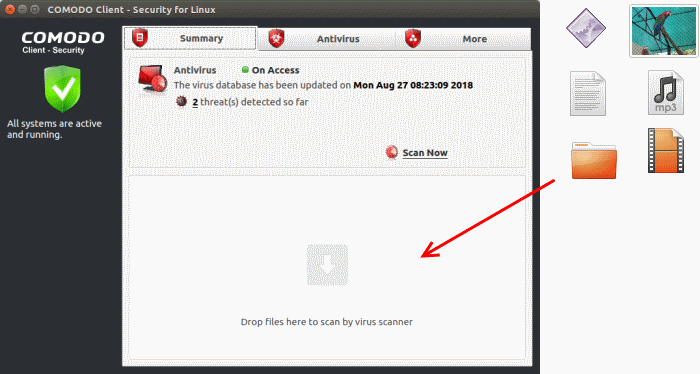Run a Scan
Click 'Antivirus' > 'Run a Scan'
- The 'Run a Scan' area lets you launch an on-demand scan on an item of your choice.
- The item scanned can be anything you choose - your entire computer, a specific drive, or even a single file.
- You can also scan a wide range of removable storage devices, including external hard-drives, USB sticks, digital cameras and more.
Run an on-demand virus scan
- Open Comodo Client Security
- Click the 'Antivirus' tab
- Click 'Run a Scan' in the antivirus tasks area
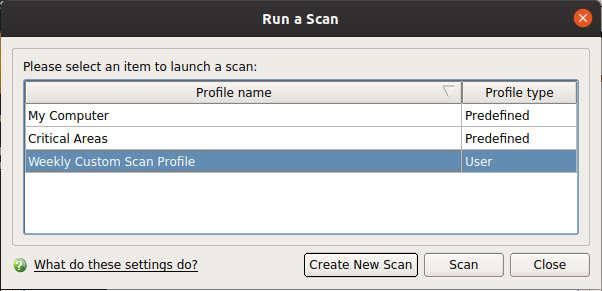
Choose
one of the following options:
Profile name - A scan profile defines the folders, drives or areas that are covered by the scan.
CCS ships with two pre-defined scan profiles - 'My Computer' and 'Critical Areas'. These cannot be edited or removed:
- My Computer - Scans every drive, folder and file on your system, including external connected devices
- Profile type - Shows whether the profile is predefined (created by Comodo) or user-defined.
-
Create New Scan – Create your own custom scan of specific files, folders or drives.
Click 'Scan' after making your selection.
You need to create a scan profile in order to run a custom scan. Once created, you can re-run the scan in future.
- Open Comodo Client Security
- Click the 'Antivirus' tab
- Click the 'Run a Scan' box
- Click 'Create New Scan'
- Type a name for your new profile. For example, 'My External Drives'.
- Click 'Add' to choose files, folders or drives you want to include in the profile
- Click 'Apply'. Your new profile will be listed in the 'Run a Scan' dialog
- Note – You can also create custom scan profiles in the scan profiles area.
- Select your new profile in the list and click 'Scan'
- Next, see:
|
Tip: If you just want to scan on a file or folder, you can just drag it into the scan box in the 'Summary' area. |
Scan progress and results
Before running the scan, Comodo Client Security will first check for AV database updates. If updates are available they will be downloaded and installed.
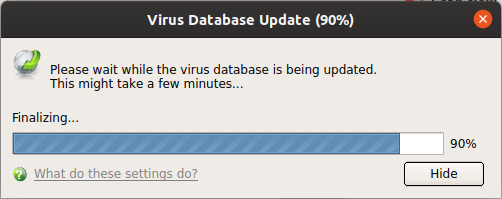
The scan, based on the profile you selected, will begin immediately.
The progress
dialog shows the profile name, the location that is currently being
scanned, the start time and duration of the scan, the total number of
objects scanned so far, and the number of threats found:
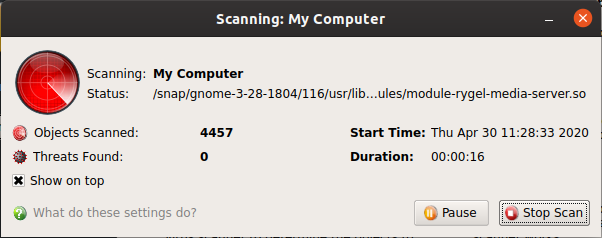
- Click 'Pause' to suspend the scan
- Click 'Resume' to recommence the scan
- Click 'Stop Scan' to abort the scan altogether
Results
are shown at the end of the scan:
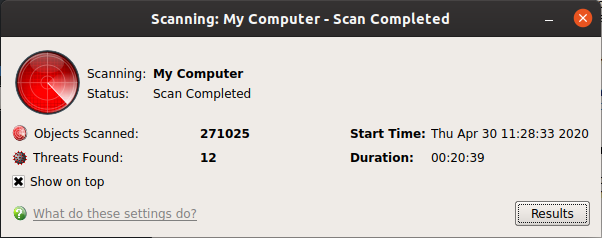
- Click the 'Results' button to see detailed file information.
- The results window lists all threats discovered by the scan and provides controls which let you deal with the them:
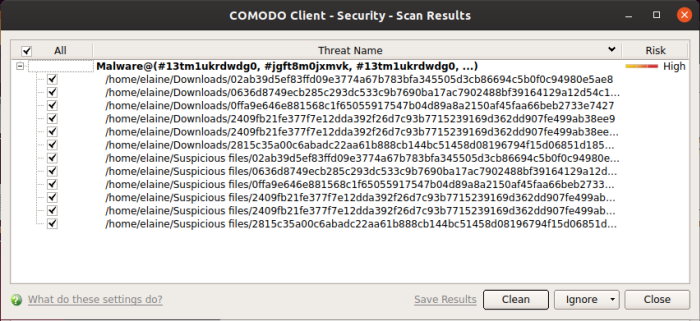
- Click the 'Threat Name' column header to sort results in alphabetical order
- Click the 'Risk' column header to sort results by risk level
- Select 'All' if you want to apply 'Clean' or 'Ignore' actions to every threat.
- Save Results – Click the link to store the scan results as a text file.
- Clean - If a disinfection routine exists, CCS will remove the infection and retain the original file. If no disinfection routine exists, CCS will move the file to Quarantine.
- Ignore - Two options:
Create a Scan Profile
- Once - The file is removed from the threat results. The file isn't, however, added to the list of exclusions. The file will be detected as a threat again by the next scan.
- Add to Exclusions - The file is moved to the Exclusions list. CCS will skip this file in future scans and not consider it to be a threat.
'Scan Profiles' let you set up custom scans on specific areas on your system. Scan profiles can be run on-demand at any time.
- Open Comodo Client Security
- Click the 'Antivirus' tab > Click 'Run a Scan'
- Click 'Create New Scan'
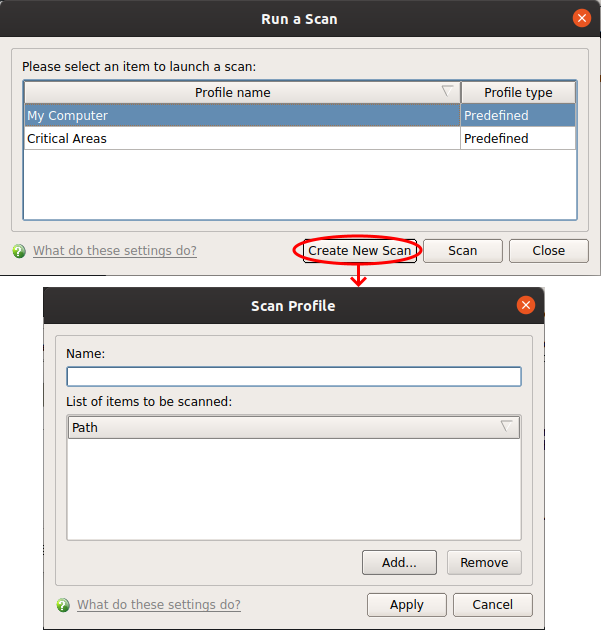
- Name - Enter a label for the scan profile.
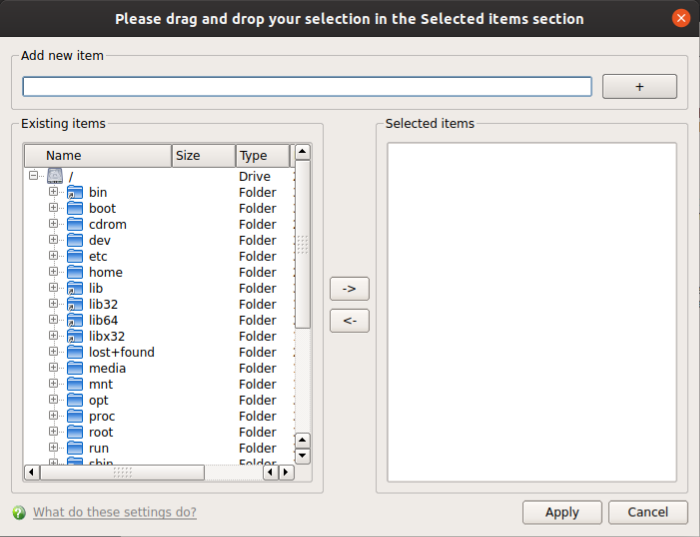
You can add items in two ways:
- Manually enter the path in the 'Add new item' field and click the '+' button.
- Drag and drop the files, folders and/or drives you require from the left pane to the right pane.
- Repeat the process to select multiple items.
- Click 'Apply'
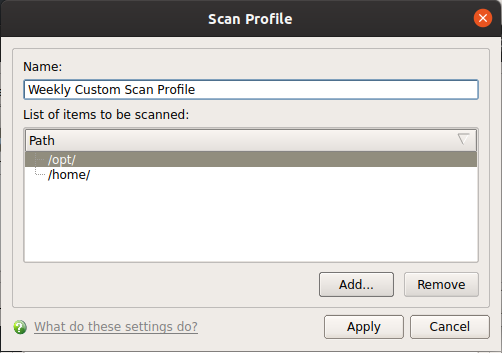
- Click 'Apply' in the scan profile dialog
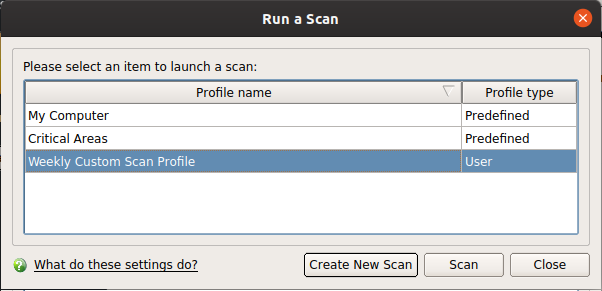
You can also create profiles
in the Scan
Profiles area (open CCS > 'Antivirus' tab > 'Scan Profiles').
- Drag items into the scan box on the summary screen.
- You can drag virtually any type of item - files, folders, photos, applications or drives.
